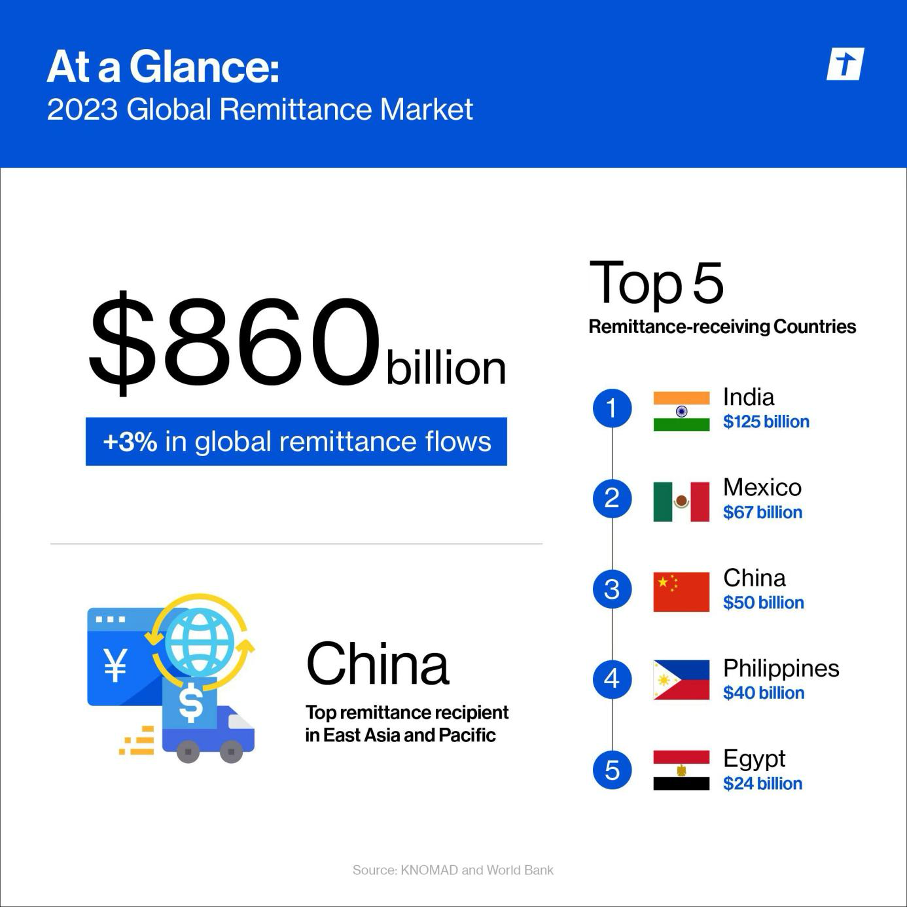Remittance, the transfer of funds by someone working overseas to family back home, has been a cornerstone of global money movement for decades. With the advent of new technology-driven channels that offer alternatives to traditional banking systems, the remittance industry has undergone significant transformation.
Traditional types of remittance, such as bank to bank, have the advantage of trust but the downside of high barriers and slow processing times. Emerging channels have made these kinds of payments more accessible, affordable and efficient. This transformation is not just a matter of convenience; it also represents a leap toward a more inclusive global financial system, bridging distances and bringing families closer, one transaction at a time.
According to the World Bank, remittances continued to grow in 2023, with an estimated growth of 3.8 percent for remittances to low- and middle-income countries, reaching $669 billion. India, Mexico and China are the top 3 remittance-receiving countries, while the United States continued to be the largest source of remittances.

Apps Gain Ground in the Remittance World
A paradigm shift has occurred in recent years, with digital remittance solutions rapidly gaining ground. According to a survey for Money Travels: 2023 Digital Remittance Adoption Report by Visa, 53 percent of the consumers surveyed were turning to digital apps to send and receive funds. In the previous few years, when mobile-money remittances grew 50 percent from 2020 to 2021, digital apps accounted for only 3 percent of remittance flows. Amid this disparity lies a promising narrative: the vast potential for digital apps to carve out a more significant presence.
This transition is fueled by a confluence of factors: the burgeoning influence of technology in finance, the growing need for speed and convenience in transactions, and the increasing ubiquity of mobile devices. With just a few taps on a smartphone, users can transfer funds across borders in a matter of minutes. Services like mobile wallets and online transfer apps reduce the need for physical travel to banks or transfer agents, serving those in remote or underserved areas.
How Tencent Is Making a Difference
Tencent, together with industry partners, has been committed to making cross-border remittance as easy as sending a message since 2016. Tenpay Global, a cross-border payment business under the Tencent Financial Technology division, is well positioned to offer a series of comprehensive, safe, convenient and inclusive services to global remittance providers, enabling a secure and efficient way for people working overseas to send money to the Chinese Mainland.
Taking on a collaborative model, Tenpay Global has partnered with over 40 global remittance partners such as Visa, Wise, Panda Remit, and Remitly to connect with Weixin, a widely used communication platform in China. The integration allows recipients in the Chinese Mainland to receive money directly to their Weixin Pay wallets within Weixin from over 60 countries and regions. This collaborative model aims to build an open global payment network and harness Chinese innovation to drive borderless payment.
Weixin helps to connect those working overseas with their families through messages and video calls. Similarly, remittance is another bridge for families separated by borders. Remitting to Weixin was particularly beneficial for the overseas Chinese workers in countries like Singapore, who regularly send money back home, offering them a seamless and worry-free remittance experience.
Together with the exclusive ShareLink feature on Weixin, overseas Chinese users can effortlessly notify recipients with one click after each remittance. Families can easily enter the funds-receiving process by tapping on notifications in the chat box, integrating social elements into the remittance process, while allowing funds to be directed to either Weixin Pay Wallet balance or bank cards linked to Weixin Pay. With a shared vision, Tenpay Global empowers industry leaders to not only facilitate transactions but also to cultivate rich, emotionally resonant experiences for their remittance users.
Beyond remittance into the Chinese Mainland, Tenpay Global is also empowering remittance for domestic workers in Hong Kong. These professionals, largely originating from Philippines and Indonesia, can send money home from Hong Kong through WeChat Pay HK, a local digital wallet operated by Tencent Financial Technology division. Their families can receive the money in a few minutes and even withdraw the funds at local pawnshops.
Our Outlook for Remittance in 2024
As we look into the second half of the year, the remittance market stands on the cusp of growth and change. The G20 already made improving cross-border payments a priority. Several countries, such as Singapore, also streamlined their regulations to facilitate smoother movement of funds, while ensuring compliance with global standards against money laundering and terrorism financing.
The realm of remittance, while fraught with challenges, also brims with opportunities, transcending financial transactions to embody emotional significance. Each remittance holds more than monetary value; it’s a tangible expression of care, support, and connection, bridging the physical distance between loved ones.
Remittance not only addresses practical concerns but also enhances the emotional experience by offering speed and convenience, in a way mitigating the distance. This personal dimension of remittance is what truly elevates its value, making it a crucial lifeline that sustains both the financial and social well-being of families across the globe.
The future of remittance looks bright, with the promise of bridging financial divides and fostering global connectivity in ways previously unimagined.





